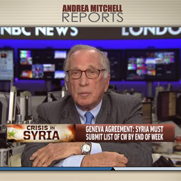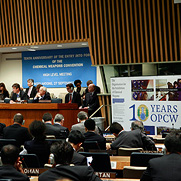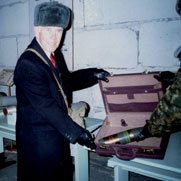
Nunn: Syria Chemical Weapons Deal a “Potential Game-Changer”
NTI Co-Chairman and CEO Sam Nunn appeared on MSNBC's Andrea Mitchell reports to discuss Syria's commitment to give up its chemical weapons.
About the image
On the heels of the freshly inked deal to destroy Syria's chemical weapons, skeptics are questioning whether the task can be accomplished by mid-2014. In a new issue brief, the James Martin Center for Nonproliferation Studies' Zachary Kallenborn and Raymond A. Zilinskas examine the challenges the Organization for the Prohibition of Chemical Weapons (OPCW) will face, along with the international community, in eliminating Syria's chemical weapons arsenal.
Among these challenges are the physical safety and security of personnel and weapons themselves, verifying that Syria's chemical weapons declaration is accurate and that there are no secret or hidden stocks and that Syria doesn't reconstitute its program when the destruction effort is complete.
Lessons from Iraq and Libya can help, say Kallenborn and Zilinskas. On physical security, the Iraq case "highlights the need to provide adequate in-country security for foreign personnel involved in the inspection and disarmament process. Violence and threats of violence against inspectors were serious concerns during Iraqi disarmament, but pose an even greater threat to successful disarmament in the Syrian case due to the ongoing civil war."
According to the authors, the Libyan case parallels the material security challenge in Syria. "Ensuring against theft or unauthorized transfer of chemical weapons and related materials during the lengthy disarmament process has been challenging in the Libyan case, and will be equally or more so in Syria," they write.
Sign up for our newsletter to get the latest on nuclear and biological threats.
NTI Co-Chairman and CEO Sam Nunn appeared on MSNBC's Andrea Mitchell reports to discuss Syria's commitment to give up its chemical weapons.
NTI board member Sen. Richard Lugar urged that the United States and Russia team up to eliminate the stockpile of chemical weapons in Syria, according to the International Herald Tribune.
NTI Co-Chairman Sam Nunn Applauds Opening of Russian Chemical Weapons Destruction Facility

